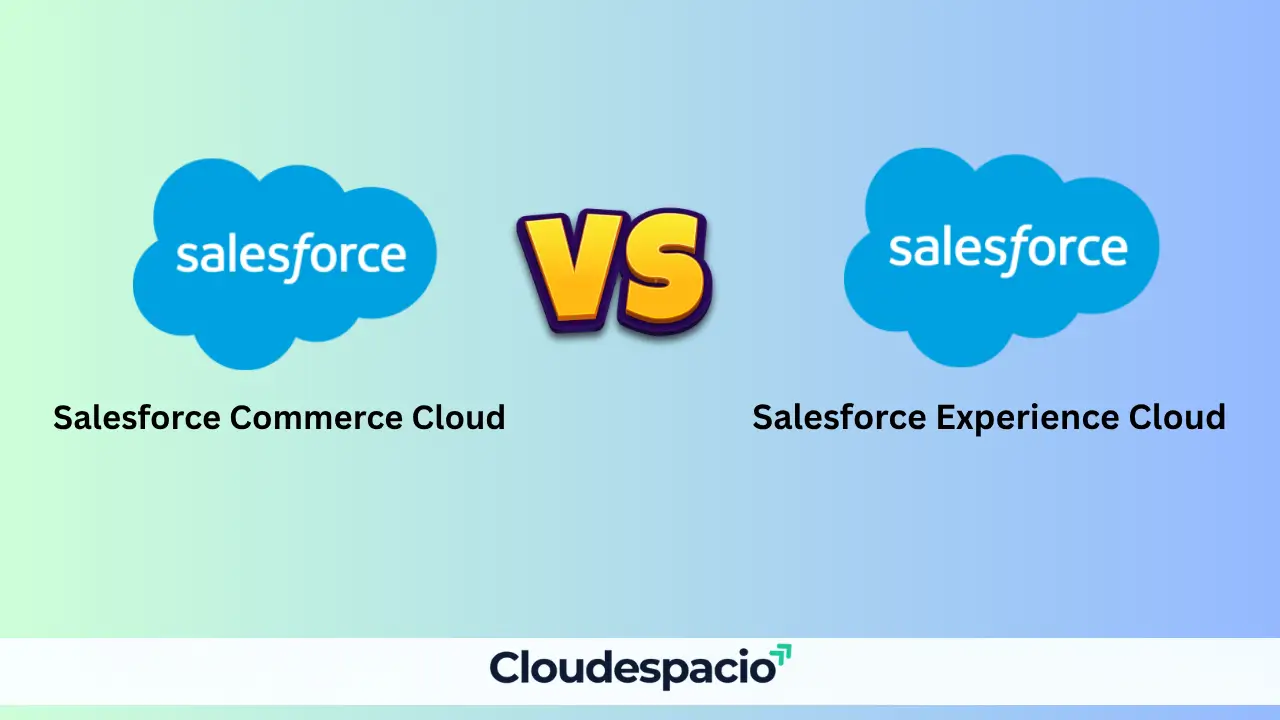


Choosing between Salesforce Commerce Cloud and Salesforce Experience Cloud can seem like selecting your preferred dish at a buffet. Every one provides something different; both look fantastic. But if you have ever found yourself conflicted between “do I go with this or that?” you will know it’s not always an obvious choice. The fact is that Salesforce provides among of the greatest solutions available, and the trick is figuring which one most matches your company’s needs. So today we compare Commerce Cloud vs Experience Cloud.
Think it over. You’re operating an internet business and your revenue is increasing, but the headaches are also. The product catalog is expanding quicker than you can control. You are curious how you will keep up as customers expect a flawless purchasing experience on every device. Salesforce Commerce Cloud comes in precisely at this point.
Commerce Cloud will be your best friend if your company is all about e-commerce. This platform customizes your consumers’ experiences in addition to enabling you to handle products and customer data. Artificial intelligence powered product suggestions, customized shopping experiences, and easy channel checkout. Every time, this platform guarantees you’re presenting your clients precisely what they seek. Having a digital shopping assistant who understands your client better than anybody else is akin to having one.
Commerce Cloud’s appeal is that it seamlessly combines with other Salesforce products, like Sales Cloud or Service Cloud, to present a single view of your customer contacts. Consider every bit of that information. Not any longer hopping between platforms. You find everything you require in one location.
Alright, let’s change directions. What if your objective is to foster relationships rather than just sell goods? Suppose you are a healthcare professional, a charity, or even a corporate partner network. More than just a sales platform you search. You would like somewhere for partners, staff, and clients to meet. Here is where Salesforce Experience Cloud enters the picture.
Experience Cloud is all about creating digital communities; unlike Commerce Cloud, Experience Cloud aims to encourage this. It’s about creating gateways, information-sharing centers, and interaction spaces where clients and partners can cooperate, pose questions, or connect. Design a area for partner cooperation or even create fully branded portals for your neighborhood. Driving engagement and creating long-lasting connections rather than sales is what counts.
One major advantage is here. Chatter makes communication simple. Having a virtual meeting room where users can communicate instantly transforms the experience into an interactive and real-time one.
Online store that you are operating That is all there is to it. Companies looking for an optimized, scalable e-commerce solution would find Commerce Cloud suitable. This platform covers all from personal shopping experiences to catalog management. It can manage the complexity without breaking a sweat whether you are starting small or growing up worldwide.
Experience Cloud is the right choice if your needs center on establishing a venue for community interaction, partner cooperation, or internal knowledge sharing. For example, this is your forum if you are a charity and need a community portal where your fans can interact, ask questions, and exchange ideas.
Designed to easily combine with a range of tools and applications already used by companies, Salesforce Commerce Cloud. The open API of the platform allows for easy interfaces with third-party applications whether they involve payment systems, inventory management, or customer relationship software. This link guarantees that all systems have same client information, inventory levels, and order statuses. Connecting all of your tools in one location helps to simplify processes, lower errors, and offer a comprehensive picture of your company. Commerce Cloud simplifies scaling whether you are a tiny merchant or a large corporation, therefore guaranteeing that your company may fast adjust to changing consumer expectations while still operating effectively.
Apart from being a great platform for internal cooperation and teamwork, Salesforce Experience Cloud is also a tool for interacting with clients. Regardless of location, teams can share documents, communicate in real-time via Chatter, and properly handle projects using Experience Cloud. Employees may always reach important corporate resources and stay focused on critical activities using this central hub. Experience Cloud enables companies to get rid of inefficiencies related to dispersed information and disconnected workflows by offering one location for internal communication and cooperation. The result is increased productivity, better team coordination, and a more engaged workforce, all of which support more efficient project execution and better decision-making.
Handling confidential customer information demands top priority for security, and Salesforce surpasses expectations in offering strong security measures throughout Experience Cloud and Commerce Cloud. With Salesforce’s integrated security features, companies can protect their data and lower the chance of security breaches by using encryption, multi-factor authentication, and adherence to industry norms like GDPR and PCI DSS. This degree of protection also fosters client trust, who are more and more worried about the security of their personal data. Customers can engage boldly with your company, whether making a purchase or sharing sensitive information, knowing Salesforce stores their data securely.
The catch here is this. You need not choose only one. That is absolutely right; Experience Cloud and Commerce Cloud naturally combine with other Salesforce offerings. Suppose you have your e-commerce store set up with Commerce Cloud but want your partners to work in real-time as well. No trouble. Handle sales with Commerce Cloud; use Experience Cloud for partner interaction.
Moreover, both systems provide strong data integration features that let you keep everything organized in one location. That’s the actual strength of Salesforce.
Another major advantage of both platforms is customization. The flexibility is available to fit your brand identity whether you are creating a sophisticated online store with Commerce Cloud or developing a very interactive community portal using Experience Cloud.
Salesforce doesn’t toy about with security. Both platforms have strong security measures to guarantee the confidentiality of your data, whether it’s partner communications or customer transactions. You will have authority over who sees what, hence giving you peace of mind.
Hence, which platform should you select? It all depends on what your company needs the most Commerce Cloud vs Experience Cloud.
Commerce Cloud is the ideal solution if your company is centered on internet sales and you wish to maximize the buying experience.
Experience Cloud is your top option if you have to establish digital communities, encourage teamwork, and design interactive portals.

Cloudespacio, headquartered in Singapore, is a prominent independent Salesforce and leading consulting firm, dedicated to prioritizing client satisfaction.
Copyright © 2025 All Rights Reserved. Designed by Navpatra.

If you have a project in mind, let’s talk!